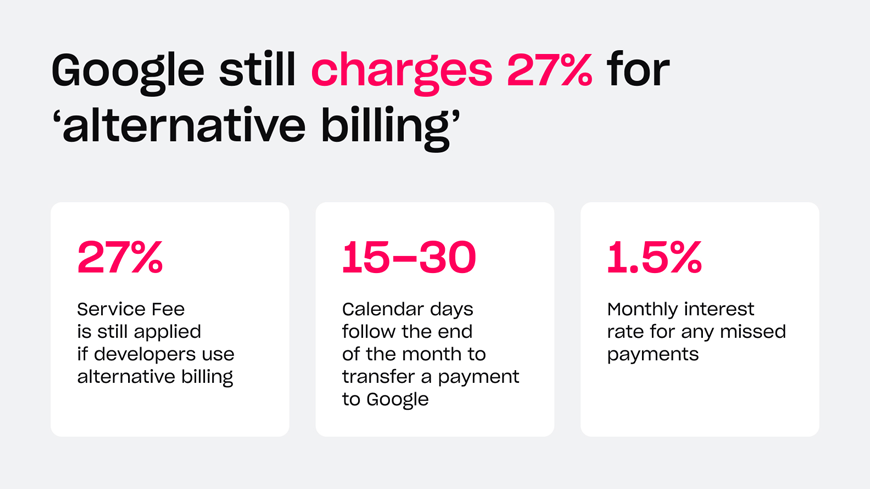More freedom for the mobile gaming market: DMA and beyond

By removing platform-imposed roadblocks, you can define your own path when distributing your game in-store and out-of-store.
Xsolla continues to lead the way in helping all our partners generate more profits for their mobile games with Xsolla products and solutions such as Web Shop, Payments SDK, and others to match mobile game developers’ needs. In 2023, we powered over 150 video games’ Web Shops that help our partners accelerate revenue by monetizing beyond the app store.
Knowledge is power. Xsolla can help you reach out to users by proactively adjusting your strategy to address, navigate, and comply with these changes. This blog post breaks down the market shifts, future caveats, and emerging benefits affecting you and game companies worldwide.
What to expect in 2024?
Beyond Epic’s initial litigation, the looming DMA’s compliance enforcement and related global rulings have pressured Apple, Google, and other platforms to start allowing alternative billing and respond to legal actions.
Alternative billing or third-party billing allows the game developer to add a payment solution different from Apple’s and Google’s built-in payments.
Despite Google being more flexible than Apple, it still requires game developers to return 27% of their earnings. Meanwhile, Google has already begun piloting alternative billing in many countries worldwide (European Economic Area, Australia, Brazil, India, Indonesia, Japan, South Africa, South Korea, and the United States,) allowing developers to incorporate third-party payment platforms.
Developers on Google Play can now offer consumers a “user choice” within the same app to select between Google Play Billing and alternative billing in pilot markets.

Apple filed a legal challenge to the EU’s DMA in November 2023. Nevertheless, Apple has acknowledged the upcoming changes with the recent press release published on January 25 announcing several updates to App Store policies.
Apple is now offering developers a choice of either keeping the existing business terms of a 30% fee or moving to the new business terms announced in the press release.

Regarding the new reduced rate: Developers must consider if the 0.50 EUR Core Technology Fee annually will positively or negatively impact their business model. Even when combined with a reduced commission, this fee introduces uncertainty. There might be a scenario where a developer experiences an influx of low-quality traffic from user acquisition campaigns that fail to monetize effectively, yet they are obligated to pay the $0.50 fee.
Alternatively — and of particular concern — if Apple alters its infrastructure (as it did in response to IDFA), it may threaten developers’ business models and still require the $0.50 fee for each user acquired in the previous year. This scenario is particularly concerning for publishers releasing free apps — e.g., for community features. On the other hand, accepting new business terms also means that developers can use alternative billing in-app, choose side-loading, and opt for a link-out option.
Unlike Google, Apple requires developers to choose either Apple’s billing system or alternative billing. In the case of alternative billing, developers will have to pay Apple a 10% (or 17%) commission, a CTF, and an additional payment to an alternative billing provider.
Apple’s policies on side-loading state that side app downloads can only occur from alternative marketplaces. In Apple’s terminology, “alternative marketplaces” are the app stores developers must build. To be compliant, app stores will go through a separate entitlement process. Apps will only be available for download on the developer’s official website via Safari (or other browsers) once they implement support for app marketplace download. App downloads directly from the web will not be allowed.
Finally, while link-out options facilitate communication with gamers in-app, Apple requires redevelopers to pay the same commissions on transactions for purchases made after following the link.
Third-party billing: a national example
If Apple’s convoluted reaction to DMA in Europe is a surprise, it shouldn’t be. Look at South Korea’s ongoing dispute about implementing a government-enforced resolution to open App Stores. A pattern has emerged where Apple will implement per-country resolutions uniquely adapted to each local landscape, resulting in similar complexity in other countries and making a strong case for direct-to-consumer relations with players.
Korea’s video game industry monetization and payments have changed significantly, allowing new payment systems (mostly digital wallets) to compete with traditional channels like local credit cards and prepaid cards. A few years ago, paying online without Internet Explorer and plugins installed on a consumer’s computer was impossible.

Still, with so many advances in Korea’s ecommerce and mobile transactions space, third-party billing options have only recently opened for developers focused on Korea’s gaming market.
- Under South Korea’s recent Telecommunications Business Act amendment, developers now have the option to implement pre-approved third-party payment solutions within their games on app stores in South Korea.
- Commission fees: Developers utilizing third-party payments in South Korea are subject to a 26% commission on generated revenue, aligning with Apple’s revised App Store policies.
- Technical integration: Implementing third-party payments requires specific technical steps. Developers must activate the StoreKit External Purchase Entitlement within Xcode, integrate designated StoreKit APIs, and submit a separate app binary specifically for South Korea’s App Store.
- Market specificity: This option is exclusive to South Korea’s App Store. Developers with global distribution plans must maintain separate builds for South Korea’s market if they implement third-party payments in that region.
Direct-to-Consumer: A timely approach to game commerce
The best method for succeeding in the current gaming market is to launch a bespoke, frictionless web-based commerce destination with exclusive player offers and rewards. A web shop lets players purchase in-game items and currencies and top up their accounts from a game-branded, developer-controlled website.
With Xsolla Web Shop, an effective direct-to-consumer solution, you can reduce commission expenses to 5% + processing fee and increase a game’s incremental revenue by 20% and more.
Add payments SDK
You can accept hundreds of new local payment methods via Xsolla Payments SDK. With this method, you can monetize underserved audiences in new regions, adding to increased revenue. However, the platform’s share portion depends on the platform rules and can be as high as 27%.
Alternative billing with Xsolla Payments SDK enables you to become the first to monetize players in regions where platforms are behind innovative local payment methods.
Choose side-loading
The power of Xsolla Pay Station SDK lets you launch a mobile version of your game for out-of-store distribution and create new business models that would be impossible in-store. As a result of the recent Google vs Epic ruling, we anticipate side-loading apps for end-users will become simpler on Android. For developers complying with Apple’s policies for side-loading, Xsolla Pay Station SDK will also be available out of the box.
Xsolla Web Shop features
Web Shop is a time-proven, direct-to-consumer method of empowering players and the game’s community to decide and vote on what’s best for them. Users enjoy a smooth experience from their first visit — login to purchase.

- Seamless authorization and a simplified purchase flow;
- Reduced friction for purchases made outside mobile;
- No login required – automated user ID when they enter the shop;
- Authorization by player ID, bound social media account, email, or login and password;
Creates personal offers exclusive to TOP players;Your web shop is a familiar destination where players can purchase in-game items and currencies and top up their accounts — all from a game-branded website that you customize for your audience.
- Tie VIP offers —priced above $500— to huge in-game advantages;
- Allow targeted offers to attract players and cohorts with a catalog customized to user needs;
- Present high-value, web shop-exclusive content (e.g., gifts, bundles;)
- Use time-limited offers and bundles in connection with valuable promotions;
- Augment web shop purchases with rewards that players can only spend on your game’s web shop items and offers;
- Connect new offers to launches and in-game events.
Web Shop benefits
- Leverages added-value content to communicate hyper-clear value to consumers;
- Enhances engagement by tying in-game events directly to web shop content;
- Creates unique, time-limited web shop bundles dedicated to events or holidays;
- Brings users back to your web shop with daily or weekly gifts that increase engagement;
- Promotes increased LTV and ARPU with exclusive VIP packs designed to monetize whales;
- Motivates players to make a first purchase;
- Relevant, targeted offers and rewards increase revenue and LTV;
- Capitalizes on game personalization by creating new rules based on user attributes.

Web Shop success story
Xsolla Web Shop is a white-label solution where each game’s web store has a unique identity, target audience, and business goals. Metrics that define each shop’s success will vary from one store to the next. This Xsolla partners’ success story offers valuable insights into the prospective health and performance of a well-planned web shop business.
A popular RPG strategy game implemented Xsolla Web Shop for its e-commerce strategy. It successfully applied a web-shop-exclusive currency pack mechanic by promoting a bonus for purchasing hard currency. The reward, which is an additional amount of hard cash, increases in proportion to the value of the purchase.
This incentive has been particularly effective, with over 50% of web shop revenue generated from packs priced above $100.
Get started on tomorrow’s success
The Digital Markets Act presents a unique opportunity for you to re-evaluate your distribution model, take advantage of direct-to-consumer opportunities, and chart a path to lower commissions, more revenue, and a smoother ecommerce experience for your players.
Xsolla is a trusted partner in building a future-proofed business model alongside video game developers. Join forces with our proven expertise and gain access to the tools and infrastructure you need to establish a vibrant direct-to-consumer ecosystem. We empower you with flexible, tailored solutions for establishing a powerful direct-to-consumer sales presence.
Schedule a consultation with Xsolla’s experienced team to discuss your specific needs and unlock new avenues for growth.
This article was originally published on the Xsolla’s blog.





